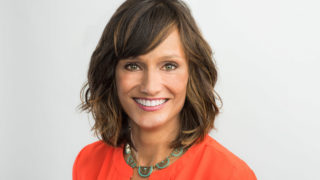
Rachel Martin started her new gig as a co-host of NPR’s Morning Edition today, and if you read between the lines of her interview with Current, the public radio newspaper, one gets the sense that the “inner-Beltway mentality” continues to crumble.
“I think now, especially in the wake of this election, public media has a mandate,” she says. “It’s an integral part of our mission to get out into the country, to parts of the country that we don’t get to usually, and understand what’s going on for people in those places and tell the stories of the people who live there. And so I’m really looking forward to being able to do that.”
With three co-hosts, one is usually away doing reporting. Martin clearly favors the idea of a more in-depth relationship with “flyover country.”
Morning Edition is planning on embedding in three to four communities over the next couple of years. That would mean Steve and David and I picking a handful of communities that we would return to every few months, and sometimes that will mean physically being there for like a week or so at a time, just developing relationships with people who live in these places — we can call them up and see how they’re doing. But it’s an attempt to kind of get deep with people, as a mechanism for really marking change in America.
I’m not so much interested in the piecemeal, like dropping in on one place one time and thinking you know what’s going on there. You just don’t. It’s just a snapshot. And I think what all of us are craving is the experience of going deep into a place and developing relationships with people there so that then the conversations we have over time can get more and more honest, because that’s the way you get people to open up about their fears.
And we saw in this election a lot of people are afraid. Economic instability, there are real fears about terrorism, scarcity of resources, and that’s connected to some people’s fears about immigration. We need to get into these communities and understand those anxieties and be able to mark how people’s lives change and how those fears are assuaged through the Trump administration or exacerbated. We can’t do that from afar.
First victory: got kids in bed by 7:30pm. Now I need to count enough sheep that I can fall asleep well, now basically. #3amwakeupcall.
— Rachel Martin (@rachelnpr) December 5, 2016
What communities? One on the U.S.-Mexico border, one in coal country, and one unnamed city, maybe in the mountain West, she says. Sorry, Minnesota.
But I think we saw in this election a lot of people are feeling like the country and the culture they grew up with is becoming something different.
And I’m interested in getting into communities that are changing demographically and understanding how people relate to the quote-unquote other, the immigrant family who just moved into a rural community in Nebraska. The Muslim family that’s moved into an all-white community of Mormons, and how these people treat each other as neighbors, how they treat each other in the community, how they reconcile their different cultural norms.
That’s the America I want to explore. That is what has made America great, is our ability to celebrate our own diversity, but that has kind of been put to the test recently. So I want to get into that tension.
In a separate interview with the Columbia Journalism Review, Martin says a major challenge is giving more airtime to individuals and groups that some may not want to hear.
Where it gets sticky is in trying to understand the line people want you to walk when it comes to covering an administration that is going to push some boundaries, potentially. We’ve already seen this in our coverage as we’ve grappled with covering the so-called “alt-right,” or white supremacist movements that have been, to some degree, emboldened by Donald Trump’s campaign.
That’s put us all in new territory in deciding how much airtime to give these kinds of voices. Is that furthering their agenda and does that fit with the public radio mission? The answer is that it does, because our job is to report the world as it is, not as we wish it were.
So that’s what we do, and that’s what we have to continue to do so that Americans can hold their lawmakers accountable and push them when they think the administration is out of line. They can’t do that unless they know the truth, and that is still the work of journalists.
Martin says the show will also be doing more popular culture stories, something that is not a specialty of current host Steve Inskeep, she says.
